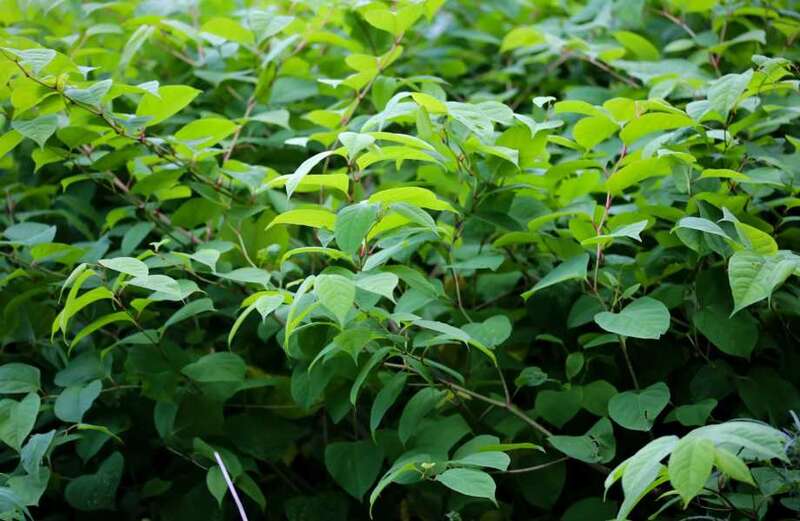MOVING house can be one of the most stressful things you can do, but one thing guaranteed to send your anxiety through the roof is Japanese knotweed.
The plant is a highly invasive, rapidly spreading weed, which can impact everything from the value of a property to a buyer’s ability to get a mortgage.

Depending on when you identify the knotweed, it can cost anywhere from a few hundred pounds to £15,000 to get rid of.
This is without any damages it may cause to the structure of the property, which you will have to fix.
Even if the Japanese Knotweed is nowhere near the building but still on the property, it can grow incredibly fast at up to 10cm a day in the summer, potentially reaching as high as 7ft.
 I'm a property expert - my guess for the cheapest time to buy a home this year
I'm a property expert - my guess for the cheapest time to buy a home this year
It can set down deep roots of around three metres, which experts say can damage concrete foundations and buildings.
And even after the plant has been removed, it still has to be declared, which meansthat future house prices are likely to remain lower for buyers and sellers.
There are also specific regulations around Japanese Knotweed.
For instance, while you do not legally have to remove it from your land unless it’s causing a nuisance,you can be prosecuted for causing it to spread into the wild.
Dave Sayce, managing director of Compare My Move and author of a guide on buying a house with Japanese Knotweed, said: “While it’s not illegal to have Japanese Knotweed on your land, it is illegal to do nothing about it and let it spread to any other property, and you can be fined up to £2,500 if you fail to do so.
“Waste material from these plants will also be classed as ‘controlled waste’ meaning you must dispose of them at a permitted waste site.”
Advice for sellers
Sellers are legally required to declare the presence of knotweed on their property when completing the TA6 form, which is a standard part of the conveyancing process.
However, the wording of the question on the form recently changed to incorporate areas “adjacent to or abutting” a home.
This means that if you want to legally respond “no”, you need to be absolutely certain that knotweed isn’t on your property or any neighbouring properties within three metres of the boundary, including rhizome (roots) beneath the ground.
 I'm a first-time buyer - how I saved half of my income to purchase £275,000 home
I'm a first-time buyer - how I saved half of my income to purchase £275,000 home
Nic Seal, founder of invasive plant specialists Environet, said: “That’s a big ask, so we advise sellers who don’t know for certain whether their property is affected to always respond “not known”, leaving the buyer to make their own enquiries.”
However, if you know that you have knotweed, you must declare it.
Bradley MacKenzie, a registered valuer at Stokemont, a London-based chartered building surveyor, explains: “Sellers… must tread carefully, as failure to disclose its presence can lead to legal entanglements.”
Seal added: “I’d urge anyone selling a home that’s affected by knotweed to be up front from the start and ensure a proper treatment plan is in place with an insurance-backed guarantee.
"That will give them the best chance of ensuring they keep their
sale on track.”
The bad news is that you’ll typically need to reduce the price by up to 15%, as getting rid of Japanese Knotweed can be a costly process.
“As a seller, you must legally disclose if you know there is Japanese Knotweed on the property," Sayce said.
"You will also have to state if there is a knotweed management plan in place. Concealing or lying about Japanese Knotweed while selling a house will open you up to legal action and you could be sued.”
Advice for buyers
Mortgage lenders are often reluctant to lend for a property that has Japanese knotweed because of the impact it’s likely to have on a house prices, especially if it goes untreated.
If knotweed is present, your mortgage lender will likely require a professional treatment plan to be put in place with an insurance-backed guarantee.
Mackenzie cautioned: “Seeking professional assistance is often the wisest course, as DIY attempts may only serve to aggravate the problem.
Seal said: “Buyers often agree to pay less for an affected property because of the so-called ‘knotweed stigma’.
This is because when the property is sold on in the future, the knotweed will still need to be declared even if it’s been professionally treated or removed.”
If a seller is unable to provide assurances either way, the safest thing to do is commission a knotweed survey. Experts will check the property and where possible, the adjoining land for any sign of the plant.
Sayce added: “Most knotweed treatment companies will offer an insurance-backed guarantee that will retreat any growth of knotweed within the guarantee period.
"However, whether this insurance is good enough… to supply a mortgage will be entirely dependent on the lender.”
In the unlikely event that knotweed appears on the property after you’ve been given the all-clear, the cost of treatment will be covered.
Alternatively, buyers can protect themselves from any future liability with a Japanese knotweed indemnity policy.
It is also important to check whether knotweed claims are covered under the home insurance policy.
Do you have a money problem that needs sorting? Get in touch by emailing money-sm@news.co.uk.
Plus, you can join our Sun Money Chats and Tips Facebook group to share your tips and stories


































